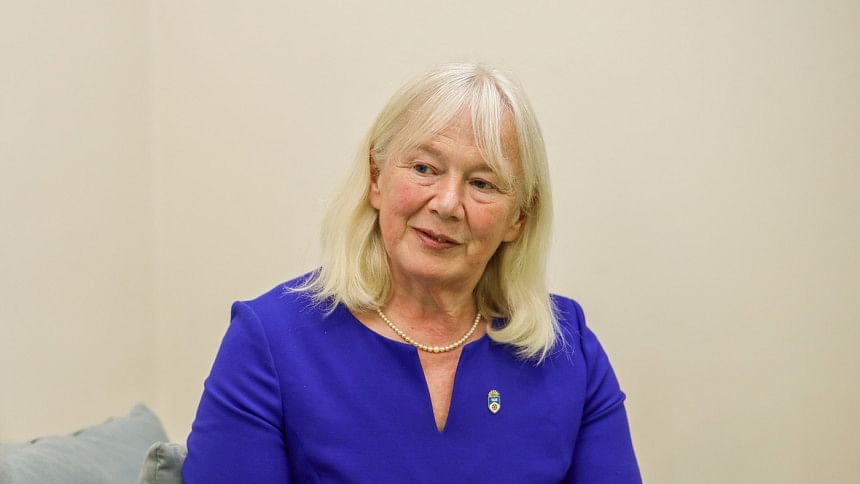More opportunities for a globalised education than ever before

Universal College Bangladesh (UCB) has recently partnered with the University of Central Lancashire (UCLan). A signing ceremony took place on June 1 at the UCB campus in Gulshan, Dhaka. In the attendance of Education Minister Mohibul Hasan Chowdhury and British High Commissioner to Bangladesh Sarah Cooke, Chairman of UCB Board of Directors Bob Kundanmal and Pro-Vice Chancellor of UCLan Prof. Catherine Jackson signed the agreement for their respective organisations.
At the event, Campus had the opportunity to sit down with Prof. Jackson to discuss pressing issues in the educational sector in Bangladesh and the merits of international collaborations.
Campus (C): Given the trend of Bangladeshi students going abroad for higher studies, what opportunities do you see contributing to this growing demand for international degrees?
Catherine Jackson (CJ): Increasingly, students everywhere are seeking global opportunities, be it in work or education. Thus, an international education, where they are exposed to different types of curriculums and students of different nationalities, provides global opportunities for them as graduates.
C: How can Bangladeshi students benefit from online resources to attain competitive knowledge and skills?
CJ: Bangladeshi students doing our courses here will have access to all of our online resources that students from UCLan have, including our library, digital, and film resources. Additionally, we create communities of students doing the same courses using technology, allowing all our students to come together as learners. Such an experience would allow students to see that there is a context to all of their learning. In the future, we are also looking at using holographic technology to transport our lecturers wherever in the world.
C: The point on the increased opportunities for international collaboration is such a unique perspective, and it makes me very excited for what we have in store for education. Do you think such international collaboration will lead to expanded perspectives for our students?
CJ: Absolutely. We do it already, even in the UK, we have three campus sites and we teach those campus sites together using one educator or teacher, who could be located anywhere in the world. Hence, we can bring the best teachers and experts to teach our students. The students have access to a wide range of different perspectives. This is important because the present generation will, in all probability, be working anywhere in the world. And we want to prepare all of our students to be able to work all over the world.
C: What would, if any, be the differences between the UCLan programmes offered at UCB and the ones offered directly at UCLan?
CJ: When working with partners like UCB, the first thing we do is fully validate our programmes. A team is arriving in three weeks to look into everything at UCB and ensure that the quality of all educational services provided here is of the same standards as those in the UK.
Then, we contextualise that learning, so that while our students will have the same learning experiences, it will be contextualised to Bangladesh so that they can understand the issues or problems to solve in Bangladesh, not necessarily in the UK because they may have no experience in the UK.
The assessments, however, would be the same. Our students will be able to transfer if they like. So, they can do a year in Bangladesh and then transfer to the UK for their second year. The course is the same anywhere you go; we simply try to cater to the individual contexts of different countries.
C: You may be aware that Bangladesh is one of the emerging countries blessed with a demographic dividend. What role can quality higher education play in growing the dividend and also enhance the employability of Bangladeshi students?
CJ: You're right, we can see that Bangladesh is a very vibrant nation. It is also a young nation that wants to develop well. We are working with UCB to ensure that the students in Bangladesh are getting maximum opportunities for working anywhere in the world, and part of that process is delivering our highest standards of education. It is also working with the employers here in Bangladesh and globally to ensure that we are fitting our graduates for work, by working very closely with those employers to give them the opportunities. So, looking at things like internships and opportunities for students from Bangladesh to come to the UK to do summer school. We run, for instance, an engineering and science summer school in the UK, where Bangladeshi students could come and learn about real-world problems that they'd need to solve in the industry.
Hopefully, we can ensure that the graduates coming from a UCLan programme at UCB will have all the opportunities that is possible to have globally.
C: As the Pro-VC of UCLan, you are responsible for health and campus development. What are your thoughts on healthcare awareness and services on campus for Bangladeshi educational institutions?
CJ: I am very excited to strategically look at how we can further develop the course portfolio from the UK. It is important to not just have elements of education and knowledge, but also to provide answers to the questions: how do students look after themselves? How do they develop resilience? How do they develop a healthy work-life balance? How do they develop healthy eating habits? To be successful, not only as a student but also as a graduate working in a very fast-paced environment, you'll need to have those skills.
C: Indeed, as a young person, it really excites me how we are moving away from the old mentality of hustling, grinding, and studying very hard to get the best jobs out there to a more holistic and healthy approach to work and life.
CJ: You know, industries are looking at this as well. They are learning that if you only hire the people who work the hardest and have the most textbook knowledge, they might only last a year or two and then burn out. So, they are looking for graduates who can stay with the company and grow and develop with the company, which is what most companies want because it is expensive to keep employing people. And you do need those skills yourself. You do need a work-life balance. You do need to understand how to be resilient when life is not going well.
I think people who succeed, even at university, are the ones who have developed those skills. They are just as important, if not more than actually picking up the knowledge.

 For all latest news, follow The Daily Star's Google News channel.
For all latest news, follow The Daily Star's Google News channel. 



Comments